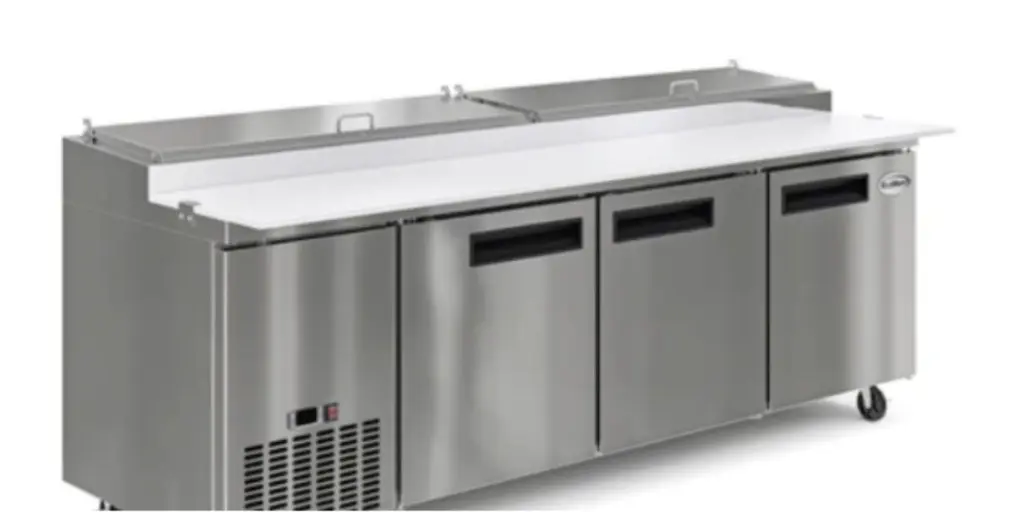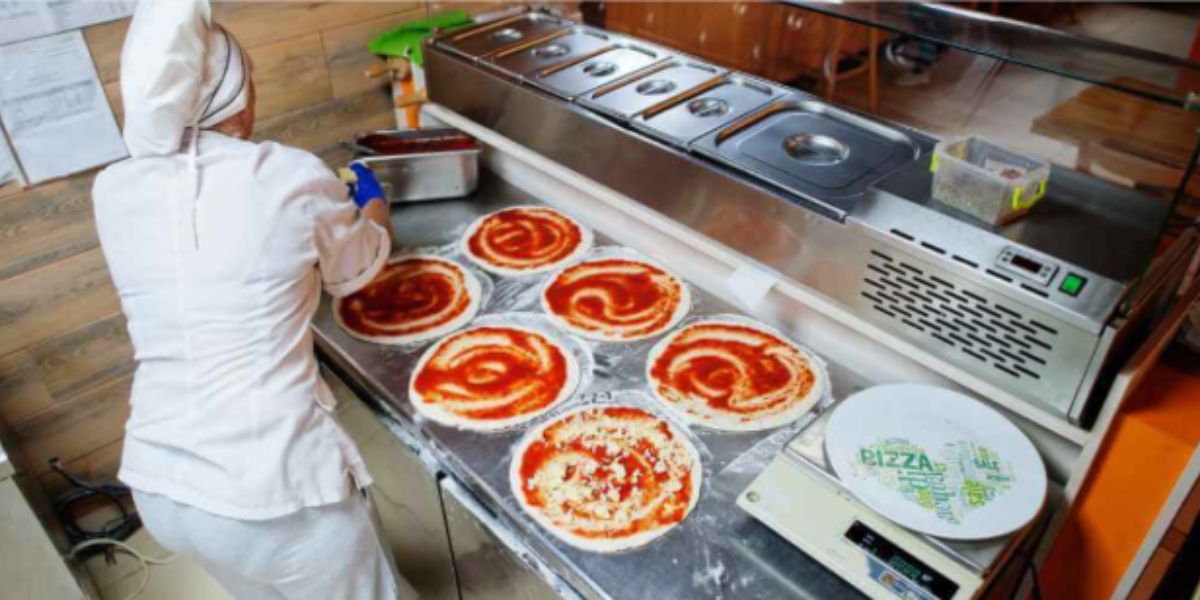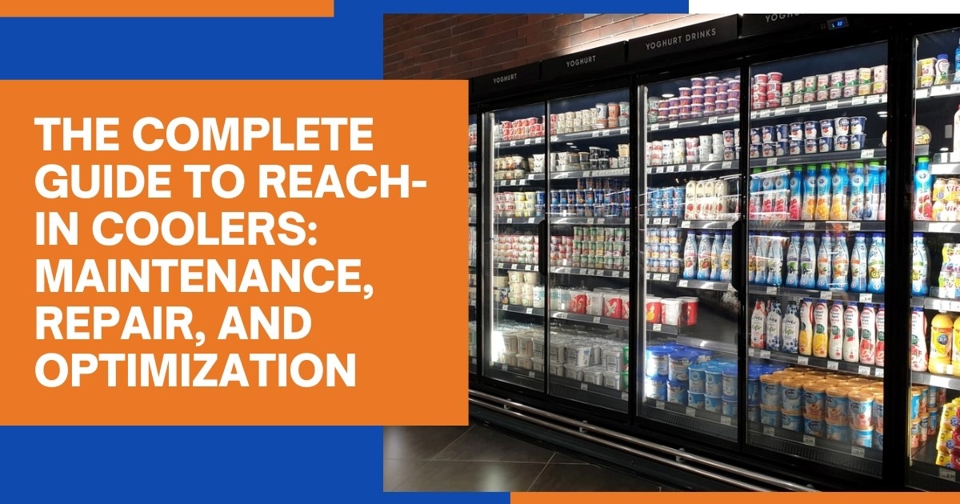A Pizza Prep Refrigerator is a special type of commercial refrigeratorthat is super important for your pizzeria. It keeps your ingredients cool and safe. This helps your team make pizzas quickly and safely. But to keep your fridge working well, you need to take care of it. Good maintenance can make your fridge last longer. It also helps prevent big breakdowns that could mess up your business.
This guide will show you easy ways to take care of your Pizza Prep Refrigerator maintenance. It will keep your fridge working great and help your pizza shop run smoothly.
Why Is Pizza Prep Refrigerator Maintenance Important?

Taking care of your Pizza Prep Refrigerator maintenanceis really important. First, it keeps the food cool and safe. This stops bad germs and food from going bad. It also saves energy and money by lowering your electricity bill. Plus, it makes your fridge last longer, so you don’t need to buy a new one often.
When you keep your fridge in good shape, it works better. This makes food prep faster and safer. It also helps you give better service to your customers. Let’s look at some easy tips for keeping your fridge in top condition.
Clean Your Fridge Often
One of the best ways to take care of your fridge is to clean it. If food spills or dirt builds up, it can make your fridge work less well. It can also make your fridge smell bad. Dirty parts can break, too. So, cleaning your fridge is really important.
Here’s how to clean your Pizza Prep Refrigerator:
- Daily Cleaning:Wipe the inside with soap and water every day. Don’t forget the shelves and drawers. They collect crumbs and bits of food.
- Weekly Cleaning:Clean the coils and fan blades once a week. If they get dirty, your fridge can overheat and use more energy.
- Monthly Cleaning:Clean the door seals every month. Look for cracks or dirt that can make your fridge lose cold air.
Check the Temperature Often
The temperature in your fridge needs to stay just right. If it changes too much, food can go bad or spoil. Your fridge should stay between 35°F and 38°F. Too high or too low, and your food might spoil.
Here’s how to check the temperature:
- Use a thermometer to check different spots inside your fridge.
- Make sure the thermostat works and adjust it if needed.
- Check the temperature often to catch any problems early.
Look at the Door Seals
The door seals are very important. They keep the cold air in and stop warm air from getting inside. If the seals break, your fridge will work harder and use more energy.
Here’s how to check the door seals:
- Look:Check the seals for cracks or tears. If they look broken, they may need to be replaced.
- Dollar Bill Test:Close a dollar bill in the door. If it slides out too easily, the seal is too loose.
- Clean the Seals:Wash the seals with warm soapy water. This keeps them clean and helps them last longer.
Keep the Coils Clean
Dirty coils are a common reason fridges stop working. Coils get rid of heat. If they get too dirty, your fridge can’t cool down properly. This makes your fridge use more energy and can break the compressor.
Here’s how to clean the coils:
- Use a brush or vacuum to clean the coils once a month.
- Make sure there’s nothing blocking the coils, so air can flow freely.
Make Sure Your Fridge Has Good Airflow

Good airflow helps your fridge stay cool. If you stuff too much in the fridge, it can block the air vents. This makes it harder for the fridge to stay cold.
Here’s how to keep airflow good:
- Don’t overload your fridge with too many ingredients.
- Leave some space around the fridge for air to flow.
- Make sure food isn’t blocking the vents.
Prevent Problems Before They Start
You can also do preventative maintenance. This means checking your fridge before it has big problems. Have a professional technician check your fridge once a year. They can check the refrigerant, compressor, and make sure everything is working well.
Conclusion
Taking care of your Pizza Prep Refrigeratoris important. Clean it, check the temperature, and look at the door seals and coils. This will help your fridge last longer and work better. If you take care of it, your fridge will always keep your ingredients safe and fresh.
At R&R Refrigeration & Air Conditioning, we help make sure your fridge stays in good shape. Regular maintenance helps your fridge last and run smoothly.
FAQs
How often should I clean my pizza prep refrigerator?
It’s important to clean your pizza prep refrigerator every day to remove food debris and spills. Additionally, clean the coils and fan once a week to prevent dust buildup, which can affect cooling efficiency. Don’t forget to clean the door seals once a month to maintain their effectiveness and ensure the fridge is running efficiently.
What temperature should my pizza prep refrigerator be?
To keep your pizza prep refrigerator safe and fresh, set the temperature between 35°F and 38°F. This range keeps ingredients cold without freezing and stops bacteria from growing at warmer temps.
How do I check the door seals?
To check the door seals, perform the dollar bill test. Close the door with a dollar bill inserted between the seal and the refrigerator. If you can easily pull the bill out, the seal may be damaged or loose, which can cause cold air to escape and affect the fridge’s performance.
Why isn’t my pizza prep refrigerator cooling well?
There could be several reasons why your pizza prep refrigerator isn’t cooling well. Dirty condenser coils or a malfunctioning thermostat are common causes. It’s essential to clean the coils regularly and check that the thermostat is working correctly. If these don’t work, you might need a technician. They can check the refrigerant levels or other parts inside.
Can I clean the pizza prep refrigerator myself?
Yes, basic cleaning tasks like wiping down the interior, checking the temperature, and cleaning the door seals are tasks you can handle yourself. For complex issues like low refrigerant levels or a faulty thermostat, call a professional. This helps prevent further damage.




